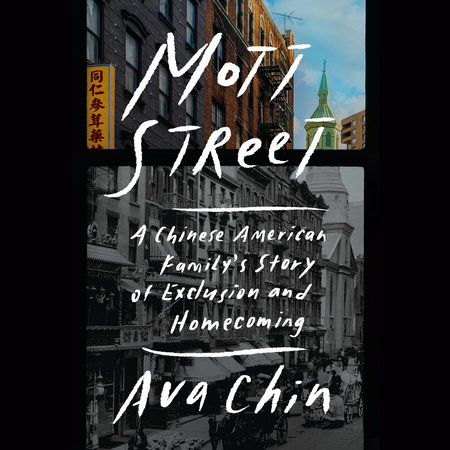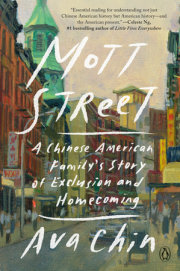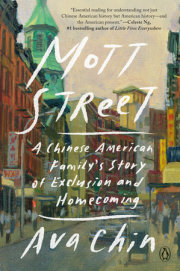1
The Elbow of Mott Street
Chinatown, New York City
As I walk past the restaurants, vegetable stands, and open-air shop fronts that line Mott Street-the main artery that pulses through the heart of Chinatown-the sights and smells here are as familiar to me as my grandparents' kitchen. Roast duck and slabs of salted pork. Vast bins of varying grades of dried shiitakes, baby shrimp, flower teas wrapped in cellophane packages. Plump dried oysters-plucked from their shells and naked, but for some black bearding and a spray of salt-so provocatively laid out that it almost hurts to look at them.
When I was a kid growing up in Flushing, Queens, before it became the "new" Chinatown, we used to come here nearly every week. Sometimes it was to see my grandmother Rose's family, or to go shopping for roast pork or Chinese beef jerky, items difficult to make at home. It always involved good food. Giant, elaborate meals of long, pan-fried egg noodles with sliced beef, chicken, pork, and verdant gai lan vegetables as long as my chopsticks. Lobster Cantonese with minced pork and lacy egg whites. A whole flounder steamed from head to tail-topped with a medley of ginger, scallions, and soy sauce-right before we devoured it down to the delicate skeleton, when it was time to flip it over and start again. Chinatown was where my maternal grandfather, Gene Wong, went on his days off to visit friends, place horse-racing bets at the local off-track betting office, and purchase in-season crabs or lobster. The smaller, younger female crustaceans were our favorite: tender, succulent, and if we were lucky, packed with rich, unctuous eggs.
I didn't know, on any of the innumerable weekend excursions we took here, that a whole other side of my family, one that I had never met, was just around the corner from our favorite Cantonese restaurant. They were there, even as we marveled at the tiny turtles or Mexican jumping beans, or sucked on sweet hawthorn berry candies or preserved plums from the Hong Kong sweets shop with the Japanese name, or tossed white gunpowder-filled pellets to make snapping noises against the pavement. If I had looked up, perhaps I would have seen them, residing right there in the elbow of Mott Street-37 Mott Street-an apartment building that had been the epicenter of the Chinese community for almost seventy-five years.
Built in 1915 after a fire destroyed a funeral parlor and a stable, the red brick building that locals called Sun Lau, or New Building, was considered the height of luxury when it rose from the ashes. The most prominent families of Chinatown flocked to live there, including members of both my maternal and paternal sides. There, they occupied the choicest apartments with views of the cross section of Mott and Pell Streets.
It's a bustling three-pronged, panoramic view here at the intersection of Mott Street and Pell, and this is where our family's story in New York begins.
So many generations of my family have lived in this building-great-grandparents, grandparents and their siblings, parents, uncles, aunts, cousins, and now, me. When I last counted, I tallied forty-nine Chins and Ng-Doshims in total, many of whom took their first breaths as wailing newborns here.
Each wing of the family can trace its lineage back to an ancestor born and raised in the same fertile Pearl River Delta, an ocean and a continent away. Although each of them had lived out west collectively through the eras of Lincoln, Grant, Harrison, and Cleveland, it would take decades for their descendants to settle some three thousand miles away, in the apartment building that stood at the heart of the community they called Tong Yun Gai. It was here on Tang People's Street that their descendants became neighbors, lovers, classmates, sworn enemies, and eventually, as fate would have it-through my own birth-family kin.
In the glassy building entrance, I catch a glimpse of myself as I pull out a hefty key and open the door to 37 Mott Street.
It's a little like Alice through the looking glass as I enter the lobby-to anyone else it resembles an ordinary entrance with stairs leading to a narrow corridor, but for me it's a portal to my family and to our history in this country. I feel that rush every time I'm here. Soon, I am climbing the front staircase, the banister worn smooth by the hands of so many generations who lived here from childhood to old age. The stairway walls look like they are covered in a century's worth of dirt and grime. I often find garbage along the steps or cigarette butts on the windowsills, and if I run my finger along the soot in the screens it's as if I am temporarily disturbing the building's sedimentary layers before they settle back down again.
I arrive on the fourth floor of what was once our family domain. Chins have lived in the building in successive generations for over a hundred years, and aside from a few sporadic paint jobs and some strategically placed security cameras, the place is pretty much as it was when my great-grandparents lived here. The hallway walls are now painted-over bricks that make the place feel a bit like a bunker, and each door along the corridor is a different color and material style-classic painted-over tenement, white suburban prefab, complete with peephole and knocker, some even with patched-up screen doors. The effect is a janky individuality that I find strangely comforting.
It is a relief, after so many years of visiting this vibrant neighborhood-exoticized by outsiders, journalists, and even, I'll admit it, by me-to finally have a space to write here. Neighbors still keep their doors open in the summer, so that the smells of home cooking and the ringing tones of our language bounce through the hallways. Cantonese and Toisanese, which my grandfather spoke-a country dialect my grandmother considered backwards, but which I find charming-prevail here. While these southern dialects, with more than double the tones of standard Mandarin, are so familiar to me, I still have difficulty deciphering their meaning. (Once, when a neighbor asked me a question and I answered her in English, she looked at me startled. "You're not Chinese?" To her, my inability to speak Cantonese or Hoisanwa meant that I must be another ethnicity.)
I turn my key and enter a small T-shaped apartment.
The first time I walked into my writing studio, my footsteps audible against the wooden floors, I felt disoriented. I kept feeling like someone was going to shock me awake from my sudden good fortune of being here, and poof, I'd be out on the street again, looking up at the building from the outside.
When my generation moved in-the fourth to live here-we found old Chinese medicine bottles and "Sloan's Liniment" in the original kitchen cabinets, with doors that refuse to shut due to a thick century's worth of paint. The old Acme food storage safe, built into the wall-every unit has one-where my family used to burn lucky paper to honor our ancestors, is now flung open and transformed into a meditation area with a yoga cushion, incense, and a singing bowl.
I am standing in the kitchen, which doubles as a living space, where my great-uncle and great-aunt raised their family, just down the hall from my grandfather's apartment, and diagonally across from my great-grandparents' old unit.
This was the place where I was going to be writing the story I had been trying to uncover ever since I was a child, estranged from my father and his whole side of my family. Back then, I grappled with so many questions that spilled over to even the folks who raised me. Who were these pioneering family members who came before us? Who were they in relation to each other? Who was I in relation to them?
Then, as now, the dark shadow of the Chinese Exclusion Act hovers over us all. Chinese Exclusion laws (1882-1943)-the country's first major federal immigration restrictions that closed its borders to a specific nationality-not only halted the majority of our legal immigration but also blocked Chinese from citizenship for sixty-one years. Coupled with earlier legislation that prevented women from freely immigrating, and had excluded Asians from naturalizing, these laws left a devastating impact on our communities across America for generations. These discriminatory laws shaped the histories of Chinatowns up and down the West Coast and reached all the way east, laying down the foundation for the very neighborhood in which I'm standing, a community that, with the COVID-19 pandemic and the ensuing anti-Asian violence, has been embattled and shaken to its very core. Still, despite these many years of racism, Chinatown is the only place for me that truly feels like a refuge.
As a writer, I believe it is important to uncover the truths from our collective past-no matter how painful or unsettling the discoveries. And so much of Chinese Exclusion has felt personal. As I tried to piece the puzzle together, I was forced time and time again to contend with my own feelings of exclusion, even from within my own family. No matter how old I was-a twenty-something writer seeking my father out for the first time, or a professor/mom to a sixth-generation New Yorker-no matter how many times I tried to understand and interview my father, I always found myself here alone, engaging in a solitary dance with the shadowy specter of having been excluded from my Chin side for so very long.
It wasn't the only erasure I felt. Growing up, my maternal grandfather, Gene, regaled me with stories of our ancestors on his side, stories about working on the railroad out west that held me in thrall throughout my childhood, well into my school years. In the sixth grade, when my teacher began the lesson on the nation's first transcontinental railroad, I thought that I already knew everything about it. But when I opened my big textbook on American history, I stared in disbelief at the official photograph. What was this nonsense? Why weren't we in the picture?
To understand what really happened, I needed to collect as many of our stories as possible. As a college student, I started interviewing my family members, and made my way out to the Church of Jesus Christ of Latter-day Saints’ genealogy library in Salt Lake City to look for traces of my railroad worker ancestor. Decades later, I continued the journey as a professor-zigzagging my way across the country to consult archives and experts, and to visit my families’ many places of detention, the border towns where they crossed over, and their sites of greatest achievement. I even moved my family across the globe as a Fulbright scholar to visit the villages in China that we had left behind. Eventually, I uncovered the Chinese Exclusion Act files on each of my major family members-manila folders filled with intrigue, half-truths, and in some cases, outright lies.
It is a general rule of thumb, among researchers and historians alike, that it is the written record that is the gold standard, and the family stories that are long on twisted falsehoods, embellishment, and tall tales. But when you're Chinese in America, with roots that stretch back to the Exclusion era, it is the historical record that is a fabulist fabrication, and the oral stories, passed down from generation to generation, like rare, evolving heirlooms, that ultimately hold the keys to the truth.
At noon, the bells from Transfiguration Church ring throughout the building and the neighborhood, just as they did when my maternal grandmother, Rose, and paternal grandfather, Lung, were children, just as they did for my father and his siblings, and for my cousins a generation later, our family spilling out and taking over this floor. I pause at my writing desk-by the window, overlooking rooftops, fire escapes, and a tenacious understory tree in the courtyard, sitting in the midst of my family's long history-and note every chime.
2
The Crown Prince
of Chinatown
Chin Family
I first saw my father as a pair of feet in Italian leather shoes, bounding down the carpeted staircase of his office building, on one of the oldest streets in Chinatown.
It was a cold, rainy late afternoon in mid-February. When I arrived, only ten minutes before, I had stood at the threshold hesitating, every button on my black peacoat fastened, my breath fogging up the windows flanking the double doors. No one else in my family knew that I was here, or that I was meeting my father for the first time. If they did, they might have stopped me-and I couldn't risk losing my nerve.
I tried to stay calm and take deep, even breaths.
I had never hidden anything this big from the family who raised me, but I had been waiting my entire life for this moment.
Finally, I pushed the buzzer.
His building, the Edward Mooney House-the only townhouse dating back to the American Revolution in all of Manhattan-was a short two-block jaunt from Mott Street that I had walked numerous times before, as a child on family outings, and later, as a young activist in the community. I had no idea back then that if I looked up to the third floor of this red brick edifice, I could see his office, and perhaps even catch a glimpse of this elusive, mysterious man.
At the barbershop next door, hairdressers were busy fashioning buzz cuts, flattops, and layer upon layer of Jennifer Aniston Friends-style haircuts. A few doors down, a crowd of tourists was entering the soup dumpling restaurant, the city's first xiao long bao joint, for dumplings so juicy one had to eat them with both a spoon and chopsticks. Pell Street was a scant two blocks long, but it had everything-ATMs, a curio shop, even a Baptist church, though it was so narrow that sometimes trucks had to traverse it with one front and back wheel hiked up on the sidewalk. I noticed that my father's name had been outside, on the street-level buzzer that I had just pressed, at eye level, the entire time. As a writer, I liked to think of myself as an observant person, but what other important things had I simply walked past dozens of times, lost in my own head?
Then, finally, I heard the sound of feet running down stairs, and saw those black leather shoes.
Suddenly, the doors were flung open, and a small face with a thin protective smile was carefully peering down at me.
I had the sensation that I was meeting someone very familiar yet very odd-it was rather like being studied from across time and down the long end of a very old, unfolding telescope.
Copyright © 2023 by Ava Chin. All rights reserved. No part of this excerpt may be reproduced or reprinted without permission in writing from the publisher.








